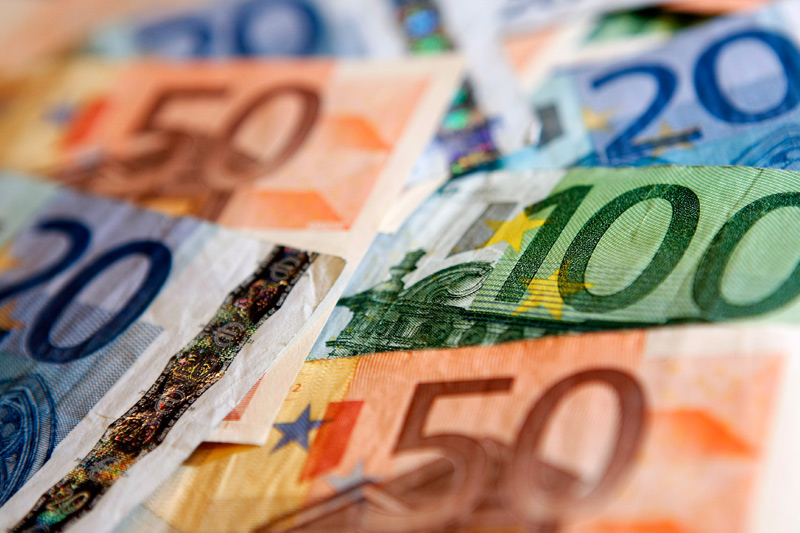Investing.com - The euro weakened against the other major currencies on Wednesday, falling to a record low against the Australian dollar, following media reports that German Chancellor Angela Merkel said she could not be certain the euro zone project would succeed.
During European late morning trade, the euro was down against the U.S. dollar, with EUR/USD falling 0.43% to 1.2241.
The euro came under pressure after Chancellor Merkel said in an interview that she was not certain the European project would be successful, but reiterated that she was optimistic in spite of the current difficulties.
Earlier in the day, Germany auctioned more than EUR4 billion of two-year government bonds at negative yields for the first time at this type of auction, reflecting sustained investor concerns over the debt crisis in the region.
Meanwhile, market participants continued to mull over mixed messages from the Federal Reserve after Chairman Ben Bernanke offered a downbeat view of the U.S. economic outlook on Tuesday, but failed to explicitly indicate if additional stimulus measures are imminent.
The euro was hovering close to a three-and-a-half year low against the pound, with EUR/GBP down 0.18% to 0.7841 and was also lower against the yen, with EUR/JPY sliding 0.55% to trade at 96.66.
In the U.K., the minutes of the Bank of England’s July meeting showed that seven of the nine member monetary policy committee, including Governor Mervyn King, voted to implement a further GBP50 billion of stimulus measures, citing “very substantial risks” to the U.K. economy from developments in the euro zone.
Separately, official data showed that the unemployment rate in the U.K. unexpectedly ticked down to 8.1% in June from 8.2% in May as the London Olympics helped to create extra jobs.
The report also showed that the number of people claiming unemployment benefits in the U.K. rose by 6,100, last month, above expectations for an increase of 5,000.
The euro inched lower against the Swiss franc, with EUR/CHF dipping 0.03% to 1.2009.
The euro hit a record low against the Australian dollar, with EUR/AUD slumping 0.37% to 1.1872 and remained within striking distance of record lows against the Canadian and New Zealand dollars, with EUR/CAD down 0.31% to 1.2401 and EUR/NZD dipping 0.03% to 1.5397.
Later Wednesday, Ben Bernanke was to testify in front of the House Financial Services Committee. In addition, the U.S. was to publish official data on building permits and housing starts.
During European late morning trade, the euro was down against the U.S. dollar, with EUR/USD falling 0.43% to 1.2241.
The euro came under pressure after Chancellor Merkel said in an interview that she was not certain the European project would be successful, but reiterated that she was optimistic in spite of the current difficulties.
Earlier in the day, Germany auctioned more than EUR4 billion of two-year government bonds at negative yields for the first time at this type of auction, reflecting sustained investor concerns over the debt crisis in the region.
Meanwhile, market participants continued to mull over mixed messages from the Federal Reserve after Chairman Ben Bernanke offered a downbeat view of the U.S. economic outlook on Tuesday, but failed to explicitly indicate if additional stimulus measures are imminent.
The euro was hovering close to a three-and-a-half year low against the pound, with EUR/GBP down 0.18% to 0.7841 and was also lower against the yen, with EUR/JPY sliding 0.55% to trade at 96.66.
In the U.K., the minutes of the Bank of England’s July meeting showed that seven of the nine member monetary policy committee, including Governor Mervyn King, voted to implement a further GBP50 billion of stimulus measures, citing “very substantial risks” to the U.K. economy from developments in the euro zone.
Separately, official data showed that the unemployment rate in the U.K. unexpectedly ticked down to 8.1% in June from 8.2% in May as the London Olympics helped to create extra jobs.
The report also showed that the number of people claiming unemployment benefits in the U.K. rose by 6,100, last month, above expectations for an increase of 5,000.
The euro inched lower against the Swiss franc, with EUR/CHF dipping 0.03% to 1.2009.
The euro hit a record low against the Australian dollar, with EUR/AUD slumping 0.37% to 1.1872 and remained within striking distance of record lows against the Canadian and New Zealand dollars, with EUR/CAD down 0.31% to 1.2401 and EUR/NZD dipping 0.03% to 1.5397.
Later Wednesday, Ben Bernanke was to testify in front of the House Financial Services Committee. In addition, the U.S. was to publish official data on building permits and housing starts.
